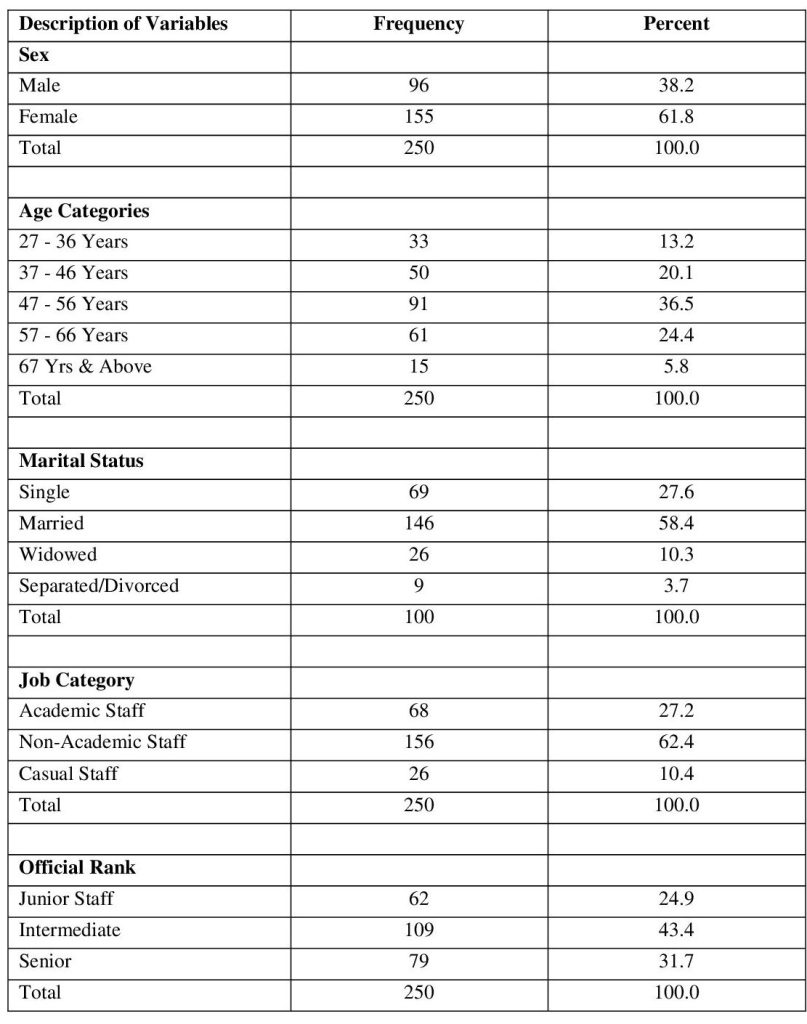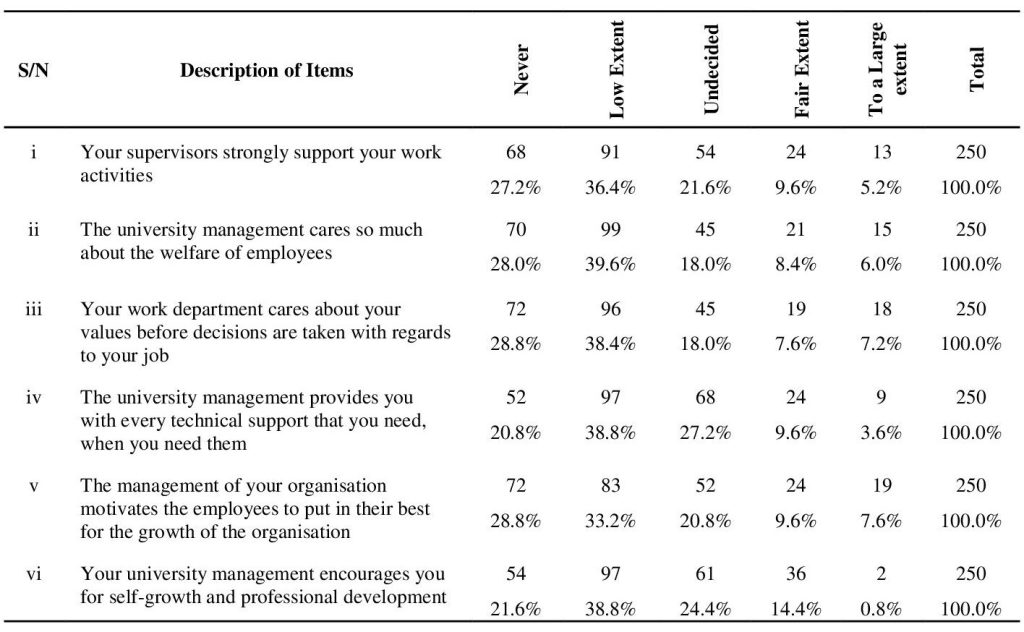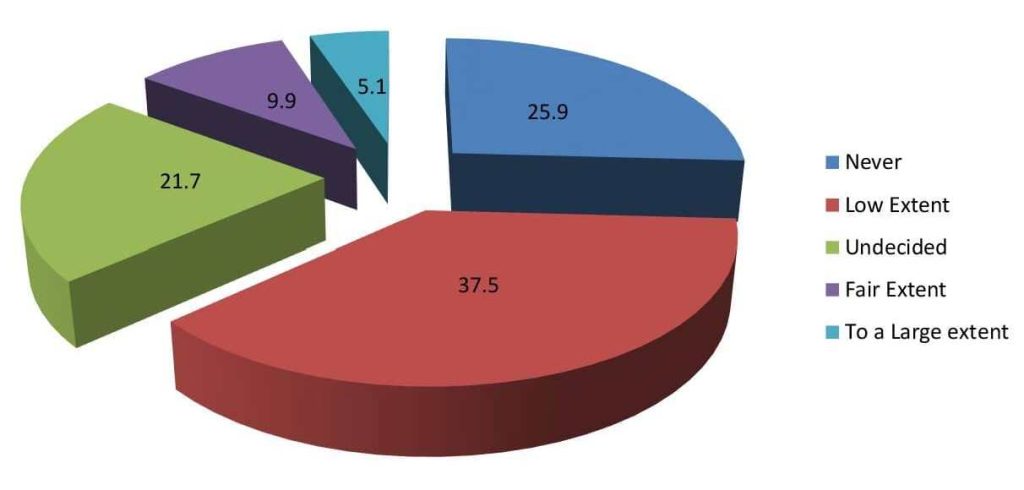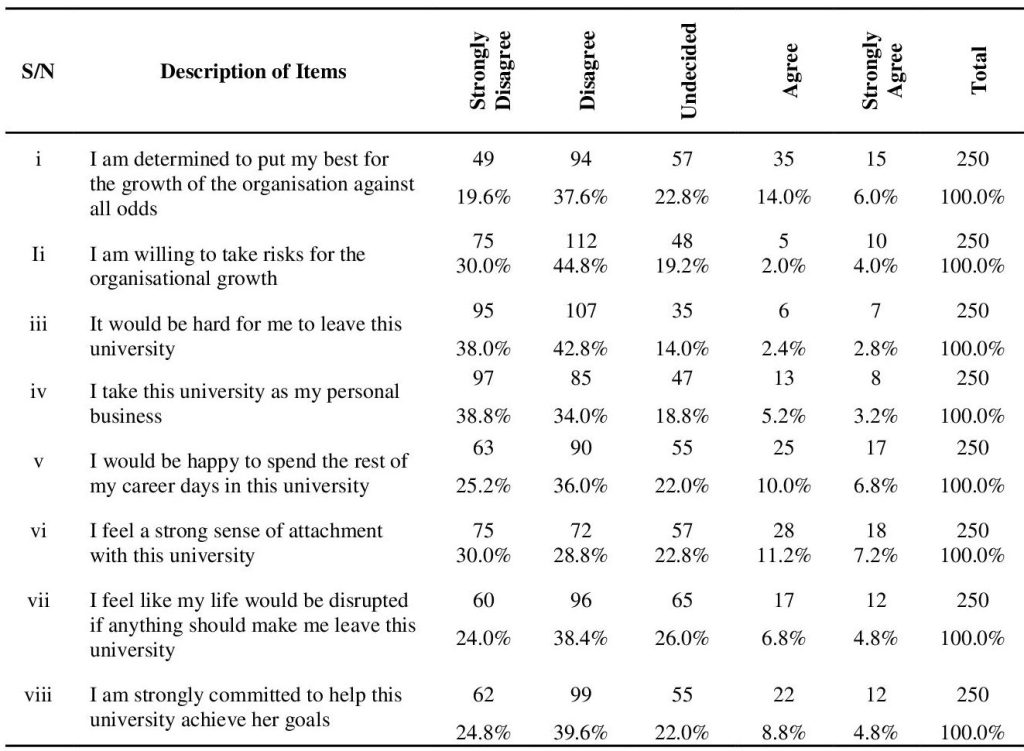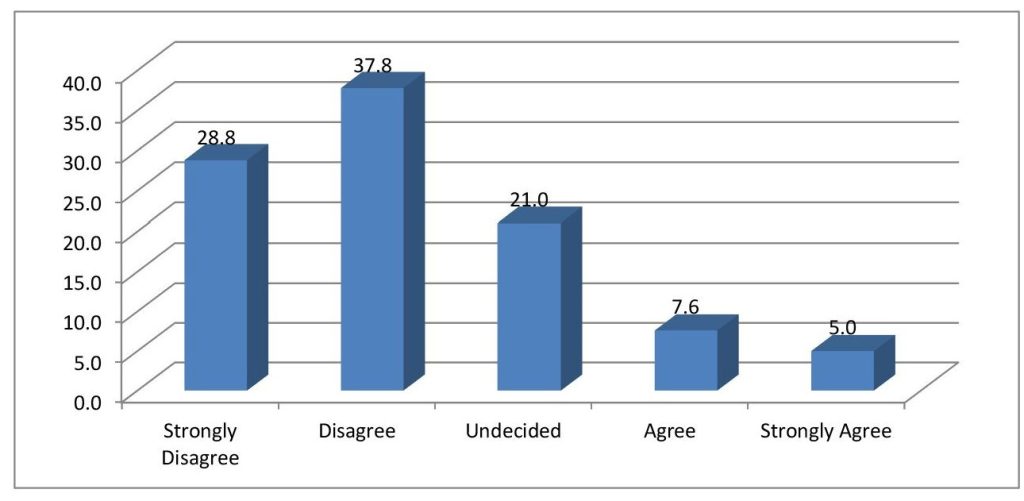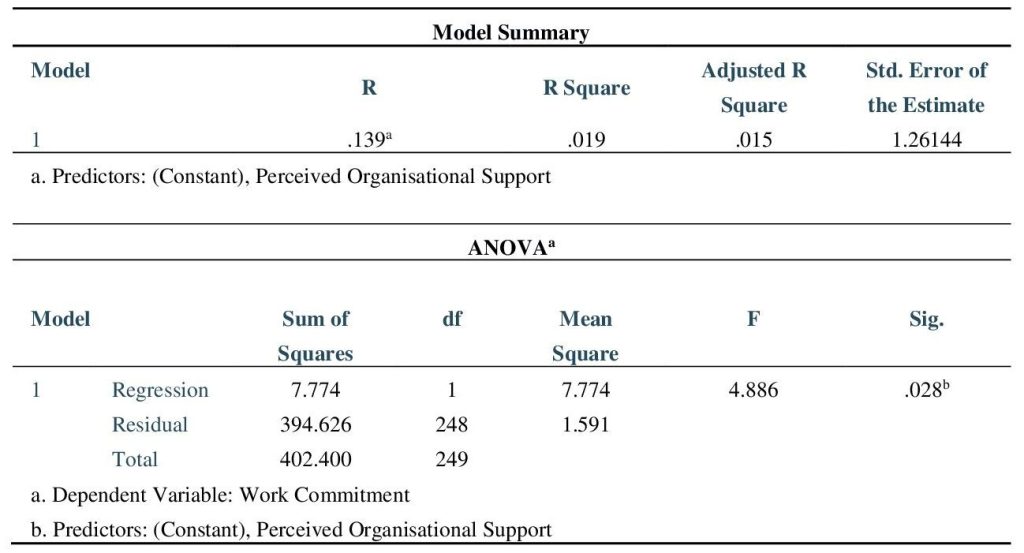|
Global Online Journal of Academic Research (GOJAR), Vol. 1, No. 1, November-December 2022. https://klamidas.com/gojar-v1n1-2022-02/ |
|||||
|
Perceived Organisational Support: A Panacea for Work Commitment among Employees in Private Universities in South-East Nigeria
By Chukwujekwu Charles Onwuka, Emmanuel Echezona Nwokolo & Sunday Chike Achebe
Abstract Organisational support is one of the cardinal factors that influences employees’ work commitment within cooperate organisations. When employees perceive that their organisation cares and provides them all the support they require, they are more likely to commit to the achievement of their organisation’s goals, which would also translate to organisational efficiency and productivity. However, the relationship between perceived organisational support and work commitment has not been significantly investigated particularly within the context of employees in private Universities within the Southeast. This study therefore aimed at investigating the influence of perceived organisational support on employees work commitment in selected private Universities in the Southeast Nigeria. The study employed the descriptive cross-sectional survey research design. The sample size for the study was 250 employees who voluntarily participated in the study through the Google Form web-based questionnaire administration. Data collected from the survey were processed using the SPSS software package. Data analysis was performed using descriptive statistics and the simple linear regression model in order to determine the influence of perceived organisational support on work commitment of employees. Findings of the study revealed that the respondents expressed negative perceptions regarding organisational support in the private Universities. It was equally found that majority of employees in the private Universities were not committed to their jobs and this was found to be statistically associated with their perception about organisational support. The study recommended the need for the management of private Universities in the Southeast Nigeria to incorporate democratic principles that could encourage employees’ engagement and openness in expressing their concerns and difficulties. Keywords: employees, commitment, organisational, support, perceived Introduction Organisational support is one of the cardinal factors that influences employees’ work commitment within cooperate organisations. In fact, many scholars have noted that organisational support offers a lot of morale to the employees, which ultimately enhances job commitment and overall productivity of the employees (Krishnan & Mary, 2012). Perceived Organisational Support (POS) reflects the degree of employees’ perception that their work organisation values their contributions and cares about their well-being (Eisenberger, 1986, as cited in Pan, Shen, Liu, Yang & Wang, 2015). It relates to the degree to which employees perceive that their work organisation values their contributions and cares about them (Allen et al., 2008). When employees perceive that their organisation cares and provides them all the support they require, they are more likely to commit to the achievement of their organisation’s goals, which would also translate to organisational efficiency and productivity. The concept of organisational support has been studies variously in relation with various dependent variables and within various organisational contexts (Li, Zhang, Yan, Wen & Zhang, 2020; Liu, 2009; Tuzun & Kalemci, 2012; Sharif, Bolt, Ahadzadeh, Turner & Nia, 2021). However, the concept of POS in relation to the work commitment has not gained popularity especially within local empirical researches. Work commitment has been defined as the feeling of responsibility that a person has towards the mission and goals of an organization (Gigli, n.d), or put differently, the level of enthusiasm which an employee has towards his/her tasks assigned at a workplace. It is the overall feeling of responsibility that a person expresses towards the goals, mission, and vision of his or her organization. Job commitment has also been conceptualised in three dimensions including affective commitment – which refers to how a person feels about their organisation, continuance commitment – which refers to extent to which a person perceives it would be desirable or undesirable to leave the organisation, and normative commitment – which refers to a person’s moral orientation to the organisation and the sense of responsibility or obligation to the organisation (Allen & Meyer, 1990). It is believed that when an individual has work commitment, he or she is more likely to perform tasks and responsibilities that will help an organization achieve a goal. Contrariwise, when employees are not committed to their work, they tend to use their time at work to perform unproductive activities such as internet surfing for pleasure, playing games, gossiping, sleeping and other anti-productive work behaviours. However, job commitment cannot be analysed in a vacuum. In other words, certain independent variables have been used as covariates of job commitment (Adekeye, 2011; Lee & Chen, 2013; Rathi & Saeed, 2022). However, there seems to be a dearth of empirical research on the relationship between perceived organisational support and job commitment particularly within the context of private tertiary institutions in Nigeria. This is therefore a research gap which this present study intends to fill. Specific Objectives
Hypothesis Employees’ perceived organisational support significantly influences their work commitment in the selected private tertiary institutions.
LITERATURE REVIEW Concept of Perceived Organisational Support Perceived Organisational Support (POS) reflects the degree of employees’ perception that their work organisation values their contributions and cares about their well-being (Eisenberger, 1986, as cited in Pan, Shen, Liu, Yang & Wang, 2015). POS is significant to increasing the employees` affective attachment to the organisation and their expectations that greater efforts towards meeting organisational goals will be rewarded. As an important concept in organisational theory, POS has been acknowledged to be positively related to job satisfaction, job performance, organisational justice, affective commitment and job satisfaction (Guan, Sun, Hou, Zhao, Lau & Fan, 2014). Perceived organisational support connotes the degree to which the organisation values employees’ contributions and cares about them (Allen et al., 2008). Rhoades and Eisenberger (2002) also added that POS is considered as an assurance that the organisation will provide financial and emotional support to employees when needed to face the challenges presented by their job. In this view, the authors argued that employees associate their favourable or unfavourable treatment by supervisors (the representatives of the organisation), as an indication that the organisation either favours or disfavours them. Hence, POS is one of the dimensions of organisational work behaviour which is hypothesised in this study to have a significant influence on University employees’ work commitment. Theoretical Framework Organisational Support Theory (OST) This theory was propounded by Eisenberger, Huntington, Hutchinson and Sowa (1986). The theory assumes that in order to meet socio-emotional needs and to assess the benefits of increased work effort, employees form a general perception concerning the extent to which the organisation values their contributions and cares about their well-being. Such Perceived Organisational Support (POS) would increase employees’ felt obligation to help the organisation reach its objectives, their affective commitment to the organisation, and their expectation that improved performance would be rewarded (Eisenberger, Huntington, Hutchison & Sowa, 1986). Behavioural outcomes of POS would include increases in in-role and extra-role performance and decreases in stress and withdrawal behaviours such as absenteeism and turnover. According to organisational support theory, employees tend to assign human-like characteristics to organisation and thus encourage the development of POS (Eisenberger et al., 1986). Agents acting on behalf of the organisations are often perceived as acting on organisation’s intentions rather than their personal motives (Levinson, 1965). This personification of the organisation is enhanced by the organisation’s legal, moral, and financial responsibility for the actions of its agents; by organisational policies, norms, and culture that provide continuity and prescribe role behaviours; and by the power the organisation’s agents exert over individual employees. Equally, due to this personification of organisations, employees base their judgments of their perceived value to the organisation on how favourably the organisation treats them. When the organisation gives resources to employees in a voluntary manner rather than under circumstances beyond their control, employees will view such aid as being genuinely valued and respected by the organisation (Cotterell, Eisenberger, & Speicher, 1992). Based on this principle, POS will be more effectively enhanced if employees view organisational rewards and favourable job conditions such as pay, promotions, job enrichment, and influence over organisational policies as voluntary behaviours of organisations (Eisenberger et al., 1986). A summary of the tenet of this theory is that, in return for a high level of organisational support, employees show commitment to help their organisation reach its goals (Aselage & Eisenberger, 2003), because organisational support has a significant effect on organisational commitment (Rhoades & Eisenberger, 2002; Riggle, Edmondson & Hansen, 2009). In view of the assumptions of this theory, it was hypothesised in this study that employees’ perception of the support given to them by their University management, would determine the level commitment they would likely exhibit in their work places. In other words, perceived organisational support may have a significant influence on the work commitment of employees in the selected private Universities in Southeast Nigeria. METHODS This study was conducted among employees of selected private Universities in the Southeast Nigeria. This study adopted the descriptive cross-sectional survey research design. According to Ihudiebube-Splendor and Chikeme (2020), descriptive cross-sectional survey research design is that which provides data for describing the status or characteristics of a phenomena or relationship among phenomena, at a specific point in time. This research design was also considered appropriate for this study due its flexibility in helping gather data at a specific point in time for a defined population. Based on statistical determination of appropriate sample using the Yamane (1967) formula, a sample of 250 respondents was determined for the study. The respondents were selected through an online-survey approach. Considering the fact that data collection was online-based, participation was voluntary. Besides the growing popularity of on-line based researches in the contemporary social research, the online survey approach was considered more flexible, convenient, cost-effective, easy in reaching a large number of respondents within a target time frame. The online automated generation of data that saves time and energy that could have been used in manual data coding, was another important benefit considered for using online survey approach, notwithstanding its deficiencies. The online-survey approach involved the use of Google Form survey administration software package in designing questionnaire measuring “employees’ perception of organisational support and work commitment”. Through the help of insiders within the selected private Universities, the web-based questionnaire link was forwarded to different social network groups for the employees through Whatsapp and Telegram. The administrators of the social network groups helped to instil confidence to the respondents about the authenticity of the questionnaire link and equally explained the reason for the research to the respondents. Prior to the period of questionnaire administration, a timeline of three weeks was set for link sharing and collation of data. This implies that the respondents were given a window of three weeks to respond to the questionnaire, after which, any other data entry was discarded. At the end of the set timeline, more than 250 entries were obtained, which is higher than the initial sample size determine for the study. Consequently, only the first 250 data entries obtained within the open window period were used for data analysis. The data obtained originally through excel spreadsheet were transformed into Statistical Package for Social Sciences (SPSS) software package version 26, which was used in processing all the relevant statistical data. Analysis of data involved both descriptive and inferential analysis. While the descriptive aspect involved frequency count and percentage, the inferential aspect involved regression analysis to test the influence of perceived organisational support on employees’ work commitment. FINDINGS Table 1. Distribution of Respondents’ Socio-Demographic Variables
Table 1 contains information on the analysis conducted in relation to the socio-demographic characteristics of the respondents. The table showed that more than half (61.8%) of the respondents were female employees compared to relatively lower proportion (38.8%) male employees within the selected private tertiary institutions. For the age distribution of the respondents, the largest proportion (36.5%) of the respondents aged between 47 – 56 years old, while the least proportion (5.8%) were those who aged above 67 years old. These findings imply that the majority of employees within the selected private tertiary institutions were mid-adult individuals. This equally justifies why majority (58.3%) of them were married compare to about a quarter proportion (27.6%) of them who were single. In terms of the analysis on the job categories of the respondents, it was found that more than half (62.4%) of them were non-academic staff category compared to 27.2% of them who were in the academic staff category, while the least proportion (10.4%) of them were under the casual staff category. With regards to the official rank of the employees, data analysis showed that majority (43.4%) of them was at the intermediate level. This was followed by the senior staff who comprised of 31.7% of the respondents, while 24.9% of them were the junior employees. Employees’ Perceived Organisational Support Table 2. Analysis of Respondents’ Perception of Organisational Support
As observed from the item by item analysis presented in table 2, the largest proportion (36.4%) of the respondents went for the option ‘low extent’ in the first items – implying that they perceive their supervisors’ support to their work activities as less optimal. In the second item, it was equally observed that the largest proportion (39.6%) of the respondents rated their ‘to a low extent’, in relation to the view that their University management cares so much about their welfare. Similar patterns of responses were observed in relation to items iii to vi, which suggests that the respondents perceived organisational support in their Universities as less optimal. These data were summed together in order to present a general analysis of respondents’ perception of organisational support within the selected Universities. Result of the analysis was presented in figure 1.
Data contained in figure 1 confirmed that the largest proportion (37.5%) of the respondents perceived their organisational support as been only at a low extent. This was followed by 25.9% of them who chose the option ‘never’ – implying that they perceived that their organisations do not support them at all. While 21.7% of them were neutral in this regard, only a very lower proportion (9.9%) of them gave a fair rating about their organisational support. Employees’ Work Commitment Table 3. Respondents’ Ratings on their Work Commitment
From the item by item analysis as presented in table 3, it could be seen that the modal frequencies occurred between the responses options ‘disagree’ and ‘strongly disagree’, compared to the other response options. In other to have a clearer picture on the responses, the data were summed together, analysed and presented in figure 2.
As shown in figure 2, majority (37.8%) of the respondents disagreed with the items in the questionnaire which measured their work commitment in the selected private Universities. This was equally followed by about a quarter proportions (28.8%) of them who went for the option ‘strongly agree’. These suggest that there was a seemingly lack of employees’ commitment to their works in the selected private Universities. This study was equally interested in determining whether or not employees’ work commitment was associated with their perception of organisational support in their various Universities. To ascertain this, items measuring perceived organisational support and work commitment were summed up to form discrete variables required for parametric test. Thus, the outcome variable (work commitment) was regressed unto the independent variable (perceived organisational support) as presented in table 4. Table 4. Summary of Linear Regression Model Showing the Relationship Between POS and Work Commitment
Consistent with the initially stated alternate hypothesis, result of the regression analysis showed an evidence to accept the hypothesis, R2 = .019, F(1, 249) = 4.886, p = .028. This implies that work commitment of employees in the selected private Universities could be statistically predicted using perceived organisational support. This implies that employees would more likely be committed to their works when they perceived that their organisations support them. This equally reiterates the importance of organisational support to the workability and commitment of employees to the achievement of organisational productivity. Conclusion/Recommendations Commitment of employees to their work is a major factor that influences organisational productivity in cooperate organisations. However, employees’ work commitment is dependent on major factors of which perceived organisational support is one of the most important factors. Having analysed all the relevant data in this study, it is concluded that the research questions raised in this study has been answered in such a manner that majority of employees in the private Universities within the Southeast Nigeria have negative perceptions regarding the organisational support in their various work places. It could also be concluded that the employees of private universities in the Southeast Nigeria are less committed to their works, and this was found to be associated with their perceptions about their organisational support systems. These have serious implications to the growth, productivity and quality of educational outputs in the private Universities in the Southeast Nigeria. Consequently, the following are recommended for way forward:
References Adekeye, D. S. (2011). Gender Differences and Work Commitment in Selected Federal Universities in Nigeria. University of Ilorin, Ilorin, Nigeria, 16(1), 61-78. Allen, M. W., Armstrong, D. J., Reid, M. F., & Riemenschneider, C. K. (2008). Factors impacting the perceived organisational support of IT employees. Information & Management, 45, 556-563. Allen, N.J., & Meyer, J.P. (1990). The measurement and antecedents of affective, continuance and normative commitment to the organization. Journal of occupational Aselage, J., & Eisenberger, R. (2003). Perceived organisational support and psychological contracts: A theoretical integration. Journal of Organisational Behaviour, 24(5), 491-509. Cotterell, N., Eisenberger, R., & Speicher, H. (1992). Inhibiting effects of reciprocation wariness on interpersonal relationships. Journal of Personality and Social Psychology, 62(4), 658–668. Eisenberger, R., Huntington, R., Hutchison, S., & Sowa, D. (1986). Perceived organisational support. Journal of Applied Psychology, 71(3), 500–507. Gigli, M. (2012). Job commitment: Definition and overview. Available at https://study.com/academy/ lesson/job-commitment-definition-lesson-quiz.ht ml#:~:text=Job%20commitment%20is%20the% 20feeling,an%20organization%20achieve% 20a% 20goal. Guan, X., Sun, T., Hou, Y., Zhao, L., Luan, Y. Z., & Fan, L.H. (2014).The relationship between job performance and perceived organisational support in faculty members at Chinese universities: A questionnaire survey.Biomed Central Medical Education, 14, 50–59. Ihudiebube-Splendor, C. N., & Chikeme, P. C. (2020). A descriptive cross-sectional study: Practical and feasible design in investigating health care–seeking behaviours of undergraduates. In SAGE Research Methods Cases. https://dx.doi.org/10.4135/97815 29742862 Krishnan, J., & Mary, V. S. (2012). Perceived organisational support – An overview on its antecedents and consequences. International Journal of Multidisciplinary Research, 2(4), 1-13. Lee, C., & Chen, C. (2013). The Relationship between employee commitment and job attitude and its effect on service quality in the tourism industry. American Journal of Industrial and Business Management, 3(2). DOI:10.4236/ajibm.2013.32025 Levinson, H. (1965). Reciprocation: The relationship between man and organisation. Administrative Science Quarterly, 9, 370-390. Li, X., Zhang, Y., Yan, D., Wen, F., & Zhang, Y. (2020). Nurses’ intention to stay: The impact of perceived organizational support, job control and job satisfaction. Journal of Advanced Nursing, 76(5), 1141–1150. 10.1111/jan.14305 Liu, Y. (2009). Perceived organizational support and expatriate organizational citizenship behavior: The mediating role of affective commitment towards the parent company. Personnel Review. Pan, B., Shen, X., Liu, L., Yang, Y., & Wang, L. (2015). Factors associated with job satisfaction among university teachers in North-eastern region of China: A cross sectional study. International Journal of Environmental Resources and Public Health, 12, 12761-12775. doi:10.3390/ijerph121012761 Rathi, N. S., & Saeed, M. A. H. (2022). Determinants of organizational commitment: the case of national dairy and food industry in Yemen. International Journal in Management and Social Science, 10(09), 59-81. Rhoades, L., & Eisenberger, R. (2002). Perceived organisational support: A review of the literature. Journal of Applied Psychology, 87(4), 698-714. Riggle, R.J., Edmondson, D. R., & Hansen, J. D. (2009). A meta-analysis of the relationship between perceived organisational support and job outcomes: 20 years of research. Journal of Business Research, 62(10), 1027-1030. Sharif, S. P., Bolt, E. E. T., Ahadzadeh, A. S., Turner, J. J., & Nia, H. S. (2021). Organisational support and turnover intentions: A moderated mediation approach. Nursing Open, 8(6), 3606-2615. Tuzun, I. K., & Kalemci, R. A. (2012). Organizational and supervisory support in relation to employee turnover intentions. Journal of Managerial Psychology, 27(5), 518–534. 10.1108/02683941211235418 Yamane, T. (1967). Statistics: An introductory analysis, (2nd Ed). New York: Harper and Row.
|
|||||

